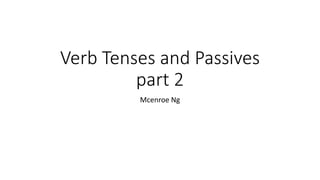Verb tenses and passives part 2
•Download as PPTX, PDF•
0 likes•119 views
Verb tenses and passives
Report
Share
Report
Share

Recommended
Recommended
More Related Content
What's hot
What's hot (20)
Similar to Verb tenses and passives part 2
Similar to Verb tenses and passives part 2 (20)
present perfect simple and continuous for Italian students

present perfect simple and continuous for Italian students
More from Nanyang Technological University, Singapore
More from Nanyang Technological University, Singapore (20)
Conjunctions, connectives, and adverb clauses part 4

Conjunctions, connectives, and adverb clauses part 4
Conjunctions, connectives, and adverb clauses week 3

Conjunctions, connectives, and adverb clauses week 3
Conjunctions, connectives, and adverb clauses part 2

Conjunctions, connectives, and adverb clauses part 2
Conjunctions, connectives, and adverb clauses part 1

Conjunctions, connectives, and adverb clauses part 1
Conjunctions, connectives, and adverb clauses part 1

Conjunctions, connectives, and adverb clauses part 1
Recently uploaded
Recently uploaded (20)
Basic Civil Engineering first year Notes- Chapter 4 Building.pptx

Basic Civil Engineering first year Notes- Chapter 4 Building.pptx
Asian American Pacific Islander Month DDSD 2024.pptx

Asian American Pacific Islander Month DDSD 2024.pptx
Measures of Central Tendency: Mean, Median and Mode

Measures of Central Tendency: Mean, Median and Mode
ICT Role in 21st Century Education & its Challenges.pptx

ICT Role in 21st Century Education & its Challenges.pptx
Unit-V; Pricing (Pharma Marketing Management).pptx

Unit-V; Pricing (Pharma Marketing Management).pptx
Z Score,T Score, Percential Rank and Box Plot Graph

Z Score,T Score, Percential Rank and Box Plot Graph
Russian Escort Service in Delhi 11k Hotel Foreigner Russian Call Girls in Delhi

Russian Escort Service in Delhi 11k Hotel Foreigner Russian Call Girls in Delhi
Beyond the EU: DORA and NIS 2 Directive's Global Impact

Beyond the EU: DORA and NIS 2 Directive's Global Impact
ICT role in 21st century education and it's challenges.

ICT role in 21st century education and it's challenges.
Verb tenses and passives part 2
- 1. Verb Tenses and Passives part 2 Mcenroe Ng
- 2. Present Perfect Progressive 1. Duration of activity in progress- I have been studying for 30 minutes! 2. Activity that just ended – I have been studying. 3. Recent habit. – I have been studying a lot recently.
- 3. Present Perfect Progressive • I can't say I have just been missing the bus. • That's not correct because when one misses the bus, it's an action that happens immediately and then it's over. It's not ongoing. So, we could express this with the present prefect or the simple past. • I have just missed the bus or I just missed the bus.
- 4. Present Perfect Progressive • For example, my boss is unhappy because I have been missing the bus lately and have been arriving late to work. • This is a grammatically correct sentence, because now we are expressing a recent habit.
- 5. Past Perfect Progressive • I had gone for a swim before I came to the office. • This is past perfect which we use for two actions that both happened in the past. One action happened before the other action. • For the first action, we use past perfect, had, and the past participle.
- 6. Past Perfect Progressive • I had been swimming before I took the picture. • Notice we have had and the past participle of be and the ing verb. This is the past perfect progressive.
- 7. Past Perfect Progressive • it is wrong to say, I had been liking the photos before Emily looked at them. • That is because like is a non-action or non-progressive verb. Like belongs to group of verbs in English that cannot take the progressive tense. For this verb we would say I had liked photos.
- 8. Past Perfect Progressive • Example The ground was wet. It had been raining before I got home. • Notice the subject here is it. We still use had, do not change had. The verb is the same for every subject in this tense. • We can also say, it had been raining for three hours before I got home. Like in the past perfect, it is common to use for, especially since we are showing duration. Or it had been raining since 6:00. • Remember, we use the progressive tense for continuous actions like rain.
- 9. Past Perfect Progressive • Example My mother had been arriving before I got home. • Because arrive is not a continuous action. For non-continuous verbs, just use past perfect. • My mother had arrived before I got home
- 10. Future Perfect (has, have) Progressive • We will have been sitting for a couple of hours already. • We will not have been sitting for a couple of hours already.
- 11. Future Perfect Progressive • There is one specific reason we use the future perfect progressive. • And that is to describe a progressive activity in the future that comes before another future activity or point in time. • We shouldn't go rollerblading. We will have been walking for 20 minutes by then. By then is a point in time in the future. • Of course, different durations of time could be expressed, like for two hours, or all day. • It is important to point out that by then is a prepositional phrase. With the future perfect progressive, there will always be another point of reference in the future, either stated or implied. • We could also use a specific time in the future, like 11 o'clock.
- 12. Future Perfect Progressive • We will have been walking all day by 11:00 • Emily and Jake will have been socializing for several hours by the time they finish their date. • In this example, the point of reference in the future is represented as a dependent clause, by the time they finish their date.
- 13. Reference • University of California, Irvine For more information https://www.facebook.com/secondarymathandscience/?ref=br_rs
